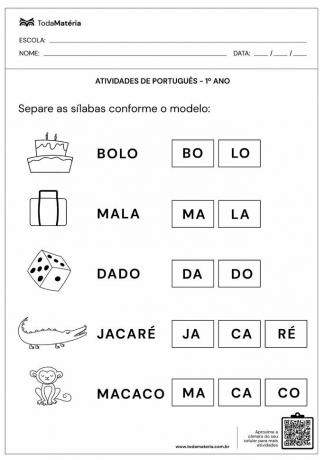O Absolutism and the formation of the Modern State is an essential matter for understanding the current world.
That's why it's a theme that is worked a lot in the classroom and charged in history tests. With that in mind, we created ten questions with commented feedback for you to prepare.
Good studies!
Easy level
question 1
The apogee of absolutism occurred in the mid-seventeenth century, with France being the country where this type of government was best manifested, which prioritized:
a) The concentration of powers in the king's hand.
b) The division of powers into three: Executive, Legislative and Judiciary.
c) The figure of the Church above all political institutions.
d) The practice of free elections.
Correct alternative: a) Concentration of powers in the king's hand.
b) WRONG. The division of powers into three would be defended by the Enlightenmentists in the century. XVIII.
c) WRONG. The church, in absolutism, was not above political institutions, but it was a great ally of the monarchy.
d) WRONG. Free elections would only take place in the 19th century in a few countries.
question 2
With the decline of the feudal world, commercial relations increased and the need to expand consumer markets as well. Then began the commercial expansion and the search for precious metals in the world. This economic practice was named:
a) Socialism
b) Liberalism
c) Mercantilism
d) Feudalism
Correct alternative: c) Mercantilism
Mercantilism was the name of economic practices of the 16th and 17th centuries that valued commercial activity, a favorable trade balance and the accumulation of metals.
a) WRONG. Socialism was created in the 18th and 19th centuries.
b) WRONG. Although it has elements of mercantilism, Liberalism was only systematized in the 18th century.
d) WRONG. Feudalism, as the question itself says, was in decay and does not fit the description.
question 3
English absolutism occurred during the reign of the Tudor dynasty which was marked by:
a) The strengthening of royal power and the nobility, to the detriment of the bourgeoisie.
b) The submission of the Church to royal power through the creation of the Anglican Church.
c) English supremacy in Europe and American colonization.
d) Increased functions of parliament.
Correct alternative: b) The submission of the Church to royal power through the creation of the Anglican Church.
The break between King Henry VIII and the Catholic Church was due to personal reasons, the divorce of Catherine of Aragon, and political reasons. In this field, we emphasize that the king could not control the Catholic Church, as its supreme head is the Pope. Thus, with the creation of the Anglican Church, it came to be subject to the king.
a) WRONG. The nobility lost space in English politics and the bourgeoisie rose socially.
c) WRONG. English supremacy in Europe would only arrive in the 18th century, but American colonization took place at this time.
d) WRONG. The parliament did not have any increase in function under the Tudors.
Middle level
question 4
“The word “absolutism” describes monarchic governments in which the king's power, not suffering great limitations or restrictions, is considered absolute. (...) However, despite being centralized and strong, the absolutist power was limited”.
(Adapted from the “Tudo é História” website https://sites.google.com/site/historia1958/orientacoes-aos-alunos-sobre-a-mostra-cultural-35-anos-da-emef-sebastiana-cobra).
What were the absolutist king's limitations?
a) Feudal lords and their private armies.
b) Religious minorities and ministers.
c) Customs, the Catholic Church and Parliament.
d) The privileges of the nobility and the trade guilds.
Correct alternative: c) Customs, the Catholic Church and Parliament. Absolute power found limits precisely on who supported the king, such as customs and the Catholic Church. In the case of England, Parliament still had to be dealt with.
a) WRONG. These were the groups most harmed during the monarchic decentralization.
b) WRONG. The ministers could limit the king's power, but the religious minorities, in the modern age, were not considered and the ministers.
d) WRONG. The privileges of the nobility were a limit to the king's power, but not the craft corporations that began to lose space in the face of economic liberalization.
question 5
It is impossible to think of Absolutism without mentioning Mercantilism. The union between the two thoughts, one political and the other economic, gave rise to the Modern State.
Which alternative does NOT summarize the relationship between the two?
a) With absolutism, the bourgeois were able to count on a unified legislation that guaranteed the centralization of taxes, stimulus to trade and a single currency throughout the territory.
b) The mercantilist practices favored commercial monopoly and the search for metals that helped the absolutist monarchs to consolidate their power against the traditional nobility.
c) Mercantilism represented the valorization of agricultural activity, which enabled the sovereign to rely on the feudal nobility to strengthen his power.
d) Absolutism and Mercantilism went together, as political centralization benefited business of the bourgeoisie and the king could count on its financing for his expansion projects territorial.
Correct alternative: c) Mercantilism represented the valorization of agricultural activity, which enabled the sovereign to rely on the feudal nobility to strengthen his power.
Mercantilism was the set of practices that valued commercial activity and absolutism relied on the bourgeoisie to consolidate its power.
question 6
During the absolute monarchy, Baroque art was lived, which fitted into the political project of the sovereigns. In light of this information, take a closer look at the image below:

Select the alternative that best expresses the relationship between Baroque and Absolutism.
a) Exaggeration, curved shapes and religiosity were used to exalt the figure of the king.
b) Baroque was a strictly religious movement that did not occur in palaces.
c) Dual baroque messages such as suffering/redemption, sadness/joy, sin/redemption were used only by the kings of the Iberian Peninsula to exalt the royal figure.
d) The French monarchy was the only one to commission grandiose paintings in order to perpetuate the monarch's image.
Correct alternative: a) Exaggeration, curved shapes and religiosity were used to exalt the figure of the king.
b) WRONG. Baroque was also adopted in palaces as well as in churches.
c) WRONG. The dual message of the Baroque was used throughout Europe and the Americas, not just the Iberian Peninsula.
d) WRONG. All monarchies commissioned works of art to exalt themselves.
Hard level
question 7
The breakup of the feudal world caused the emergence of “Modern States” in Western Europe in the 15th and 18th centuries.
Check the alternative that describes it correctly:
a) Rise of the industrial bourgeoisie in power, accompanied by economic liberalization and administrative decentralization.
b) Administrative centralization, followed by the formation of a bureaucracy and assembly of a national army, to the detriment of feudal armed corps.
c) Aid to industrial production by the State through the elimination of feudal taxes and, consequently, aid to the arts through patronage.
d) Development of the agrarian economy, where the bourgeoisie and popular support played a fundamental role.
Correct alternative: b) Administrative centralization, accompanied by the formation of a bureaucracy and the assembly of a national army, to the detriment of feudal armed corps.
a) WRONG. The phenomena described would only occur in the 19th century.
c) WRONG. Industrialization started in the 18th century, although feudal taxes were eliminated and the patronage of art by kings occurred.
d) WRONG. The economic activity of the bourgeoisie was commerce and finance (banks).
question 8
Anyone who wants to practice kindness in everything he does is condemned to pain, among so many who are not good. It is necessary, therefore, that the prince who wishes to maintain himself learns to act without kindness, a faculty which he will or will not use, in each case, as necessary. […]
Machiavelli.The Prince. Apud: SPIDER, Maria Lucia de Arruda. Machiavelli – The logic of force. São Paulo: Modern, 1993.
The quote above demonstrates that:
a) The absolutist ruler should place himself above Good and Evil if he wanted to run the Republic.
b) The leader was free to act as he wished, without fear of reprisals.
c) Machiavelli advises that the prince should be prepared for war, if it were for the good of his country.
d) The author explains that the leader should not act according to his feelings, but objectively.
Correct alternative: d) The author explains that the leader should not act according to his feelings, but objectively.
a) WRONG. The ruler would not necessarily need to place himself above Good and Evil. Just use them according to your interests.
b) WRONG. Machiavelli defends this idea in the book, but not in this passage, so the alternative is wrong.
c) WRONG. There is also nothing in the quote to support this idea.
question 9
During the 16th and 17th centuries, France was marked by religious struggles between Calvinists and Catholics. The alternative found by the royal government was to create a policy that would extinguish the crises caused by these issues, enshrined in the Edict of Nantes, promulgated in 1598.
Tick the correct alternative on the Edict of Nantes.
a) It granted freedom of worship to Protestants, with the aim of eliminating conflicts caused by religious intolerance.
b) It regularized the situation of religious minorities in France such as Jews and Protestants.
c) He gave priority to Calvinists to access public office and educate their children in Protestant schools over Catholics.
d) Extinguished the Catholic Church in France, causing the closure of religious schools and monasteries.
Correct alternative: a) granted freedom of worship to Protestants, with the aim of eliminating conflicts caused by religious intolerance.
The Edict of Nantes was essential to reconcile Catholics and Protestants. It lasted for almost a century and was revoked by Louis XIV in 1685, restarting the persecutions of the Huguenots.
a) WRONG. The Edict of Nantes concerned only Protestants in France and not Jews.
b) WRONG. This law guaranteed equality between Catholics and Protestants, so Catholics were not harmed.
c) WRONG. The document concerned social relations between Catholics and Protestants, not the closure of the Catholic Church.
question 10
There being nothing greater on earth, after God, than sovereign princes, and being established by Him as their representatives for to govern other men, it is necessary to remember their quality, in order to respect them and reverence their majesty with all obedience, to feel and speak of them with all honor, for whoever despises his sovereign prince despises God, whose image he is in the Earth.
BODIN, Jean. Les six livres de la Republique (The six books of the Republic). Paris: Fayard, 1986. Apud: CHEVALLIER, Jean-Jacques. Machiavelli's great political works today. Rio de Janeiro: Acting, 1976.p. 60-1
For Jean Bodin, the absolutist sovereign should:
a) Take as an example the rulers of antiquity to learn how to govern their nation.
b) Approaching religion in order to be able to govern from biblical teachings.
c) Be tough on those who oppose you and the government.
d) Understanding the needs of the people and meeting them as a means of securing peace.
Correct alternative: b) Approaching religion in order to be able to govern from biblical teachings.
Jean Bodin, theorist of Absolutism, indicates that the monarch must be submissive to God, as it was He who placed him on the throne. So the way to be a good king goes through religion.
a) WRONG. The passage does not mention the rulers of antiquity.
c) WRONG. Bodin, in this quote, does not make it clear what would be the best attitude for those who opposed the government.
d) WRONG. The notion of people, as we understand it today, did not exist at this time and was normally not considered.
We have more texts on the subject for you:
- Absolutism
- english absolutism
- Mercantilism
- modern state



